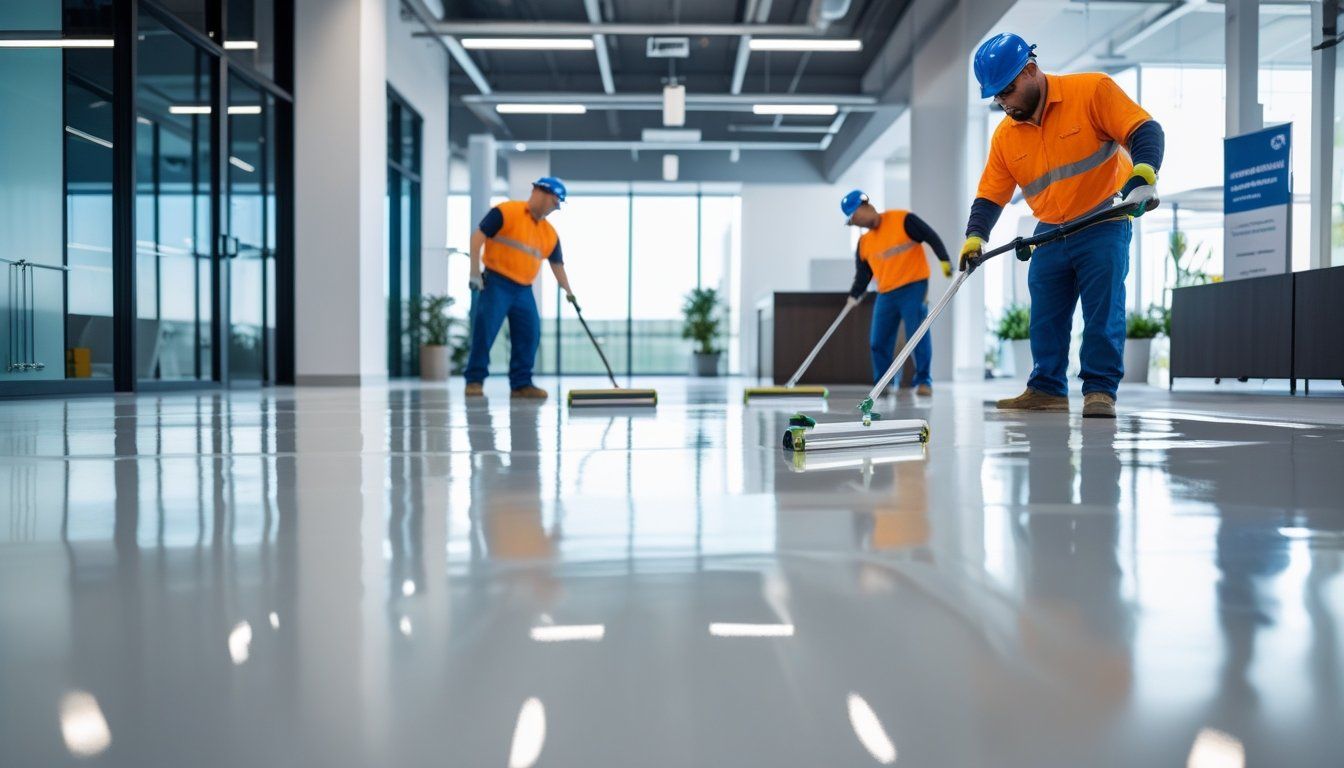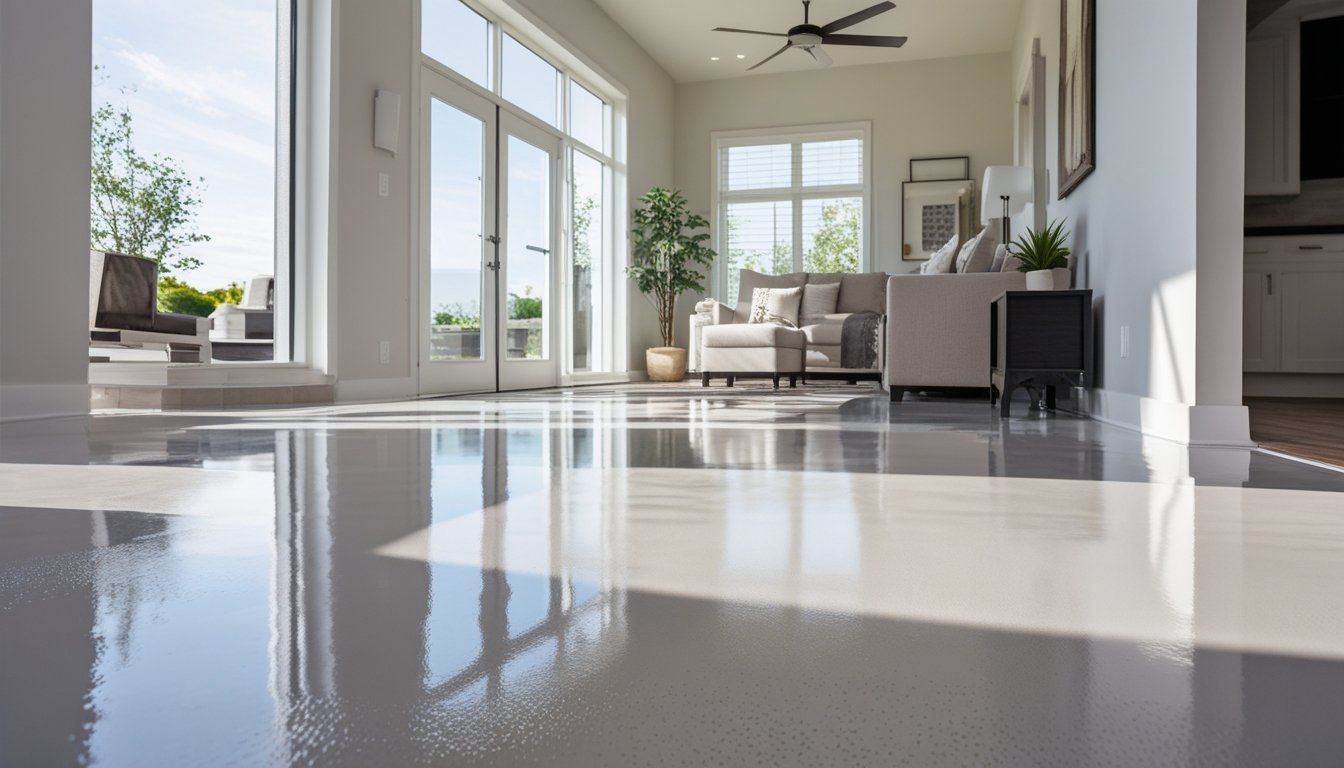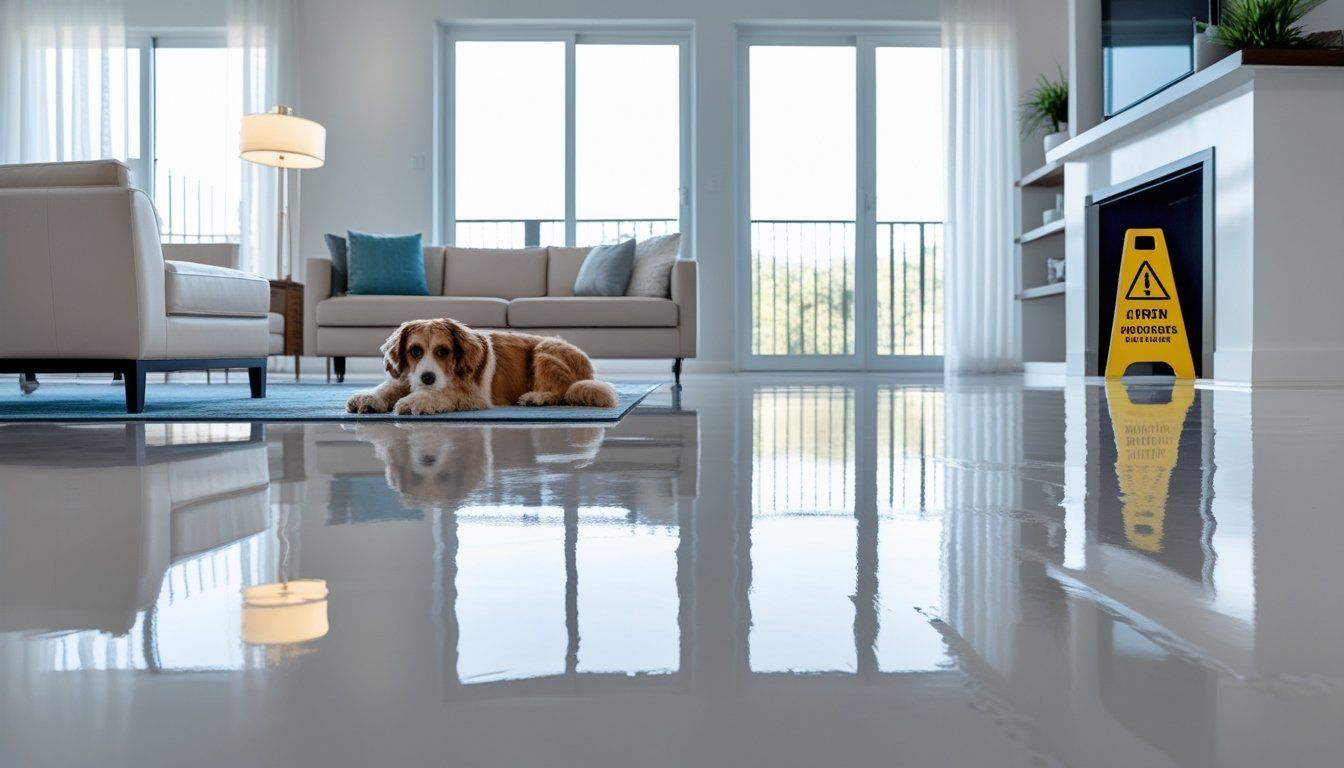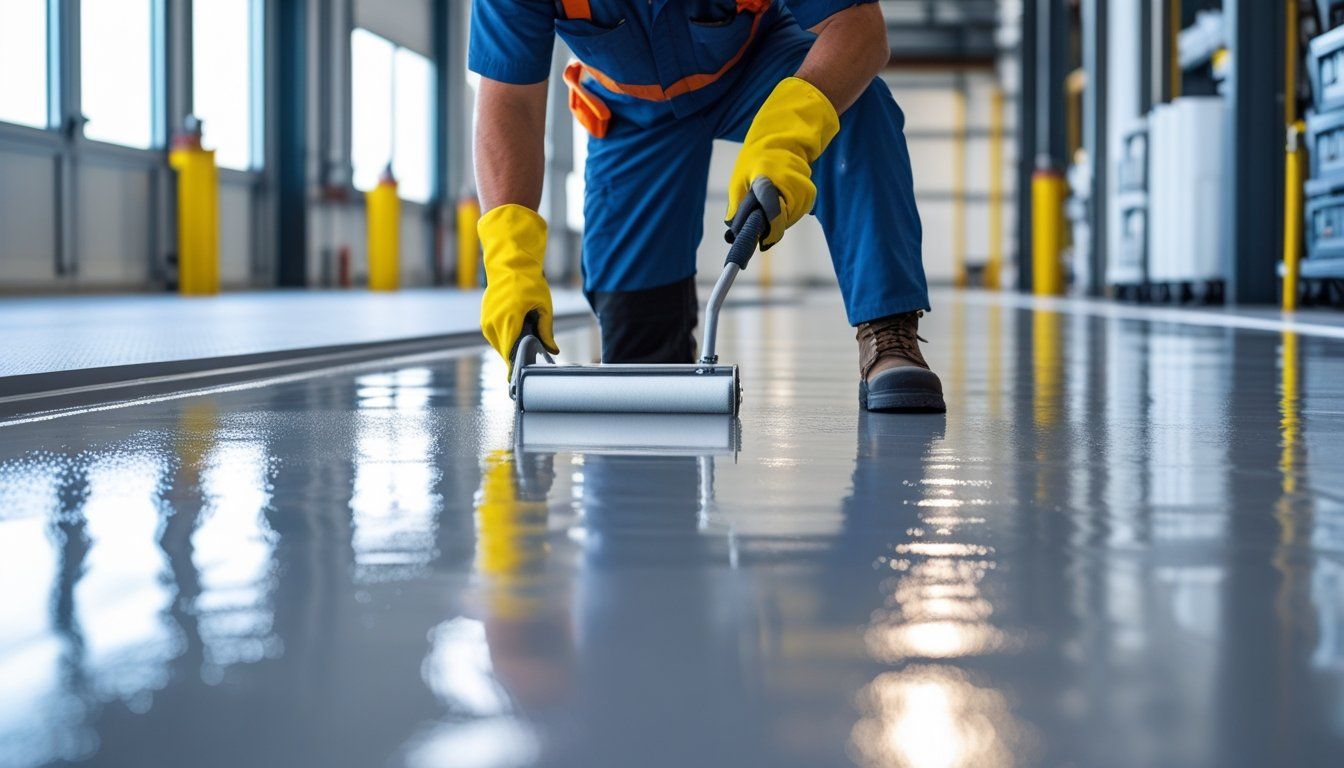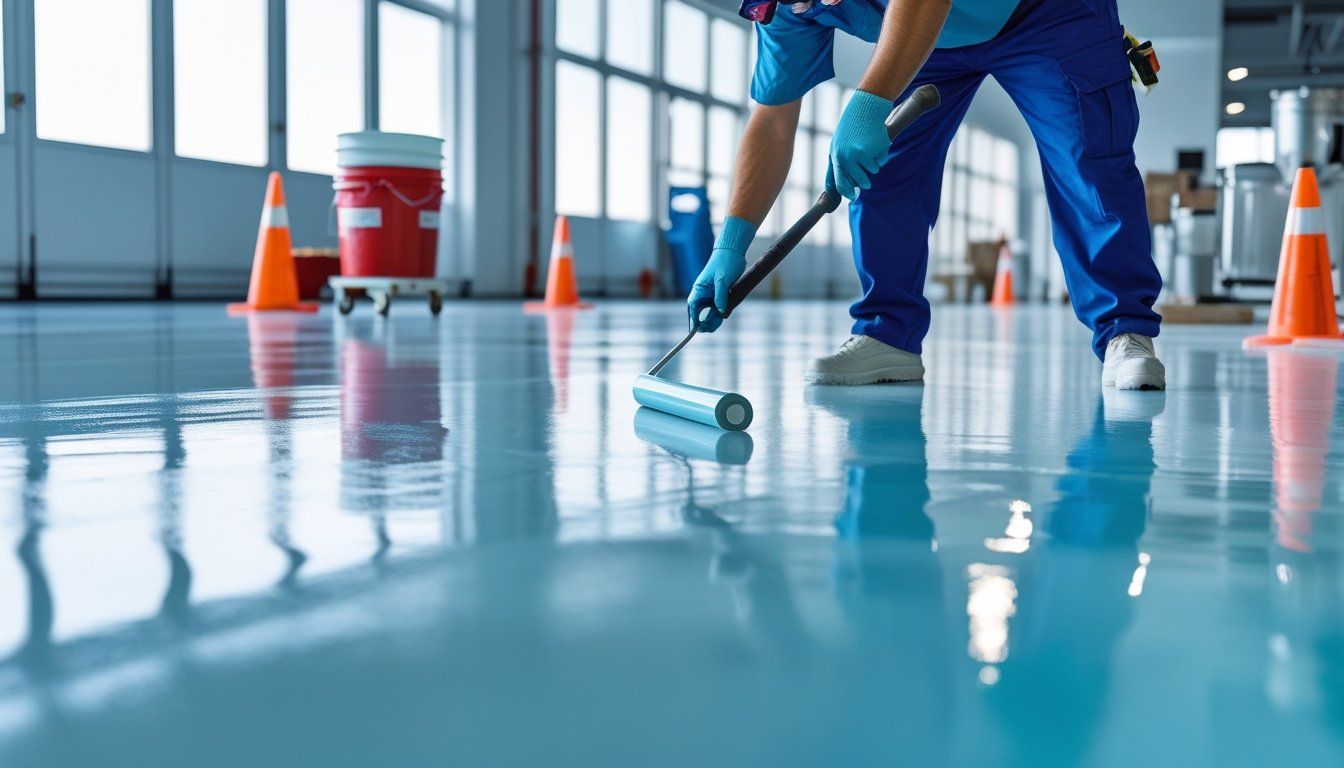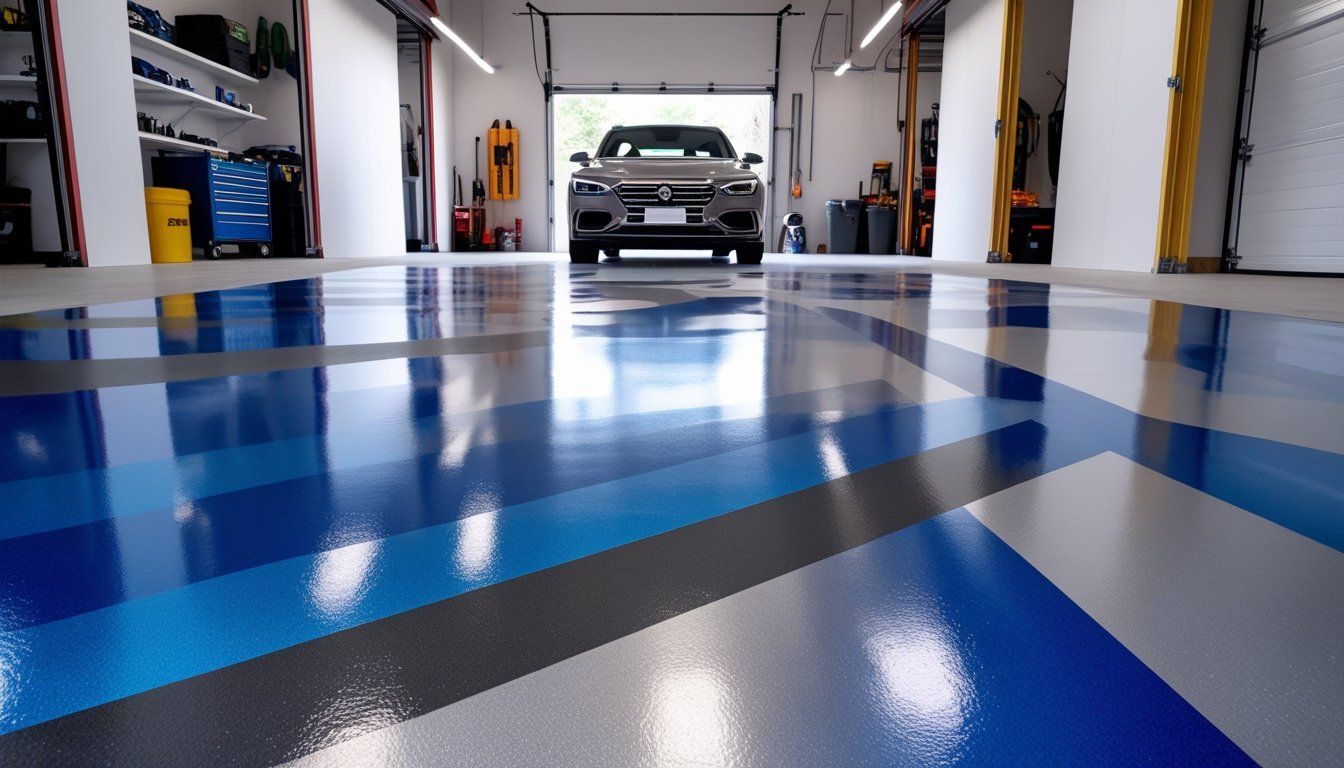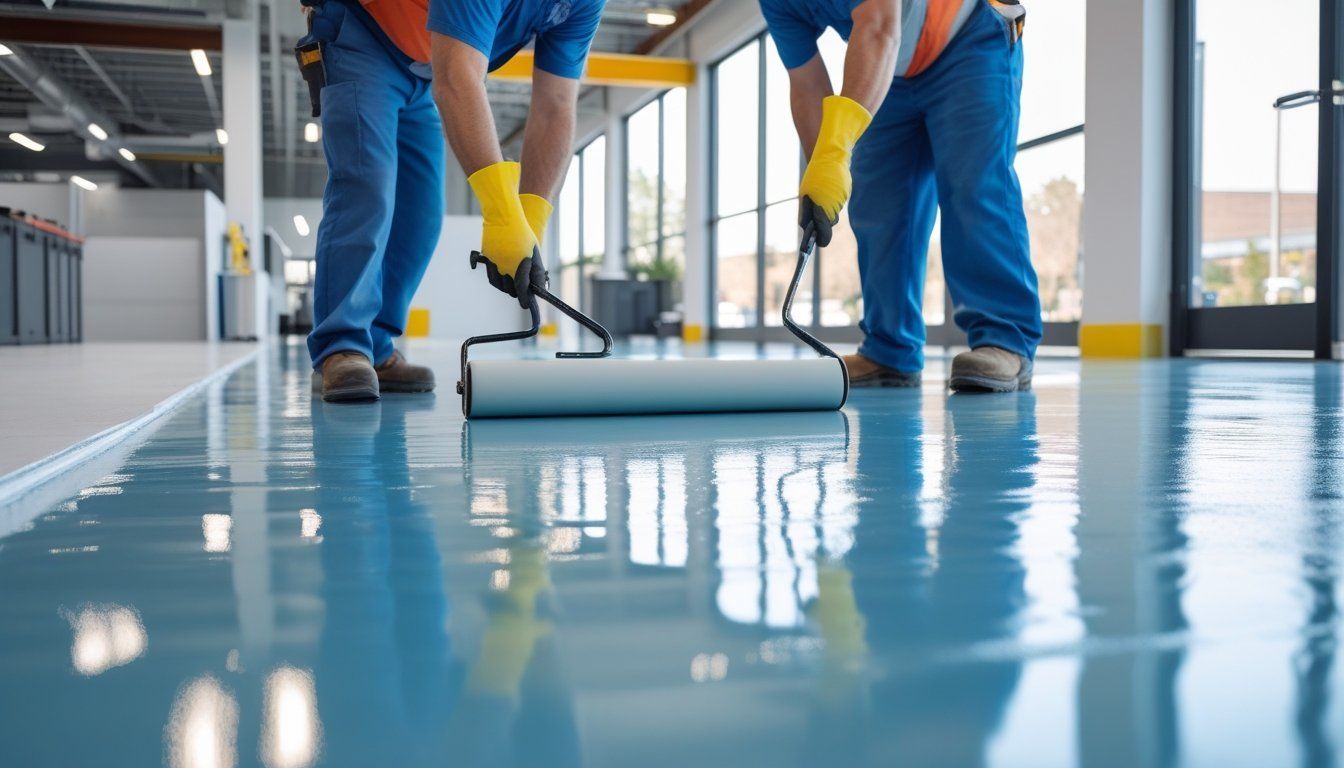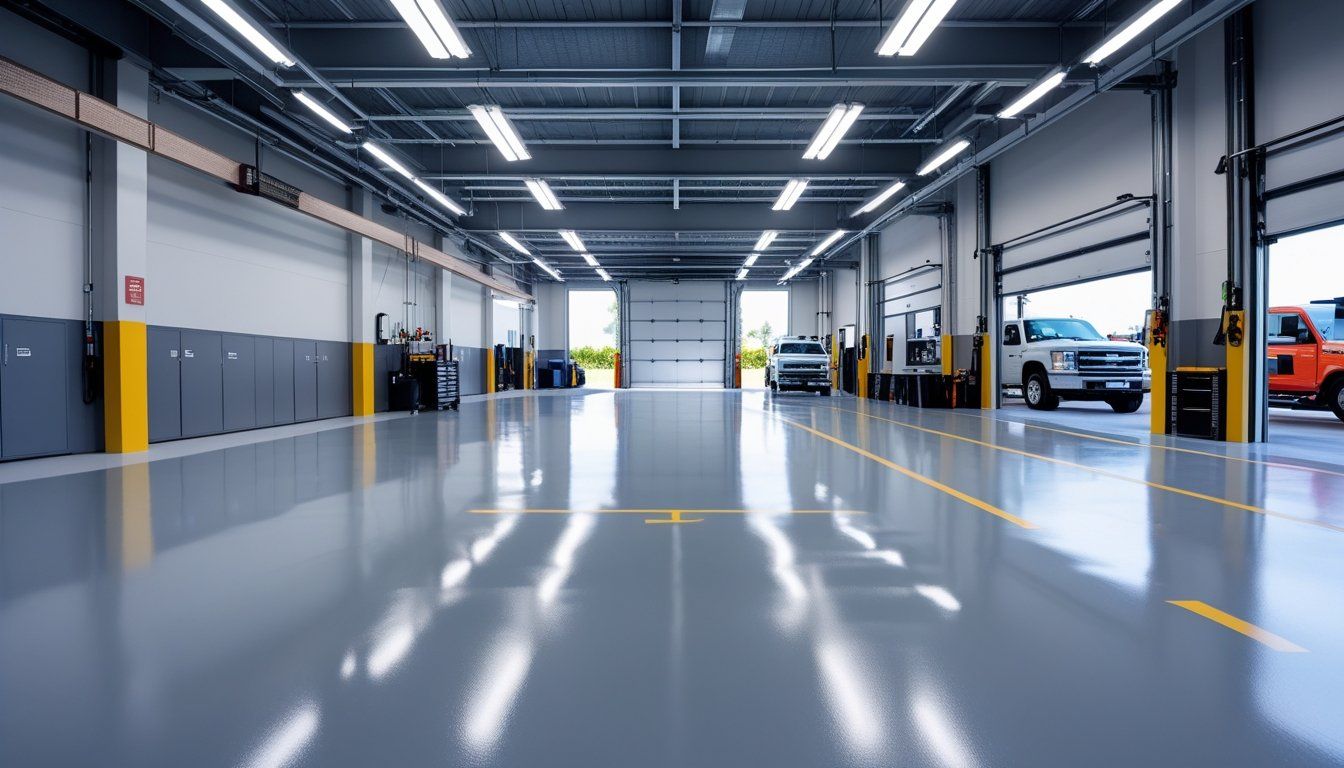Epoxy Resin Industrial Flooring Benefits and Easy Maintenance Tips
Daniel McGonagle • October 7, 2025
When you need a floor that can handle heavy use, spills, and tough conditions, epoxy resin industrial flooring is a smart choice. Epoxy floors are strong, durable, and easy to clean, making them ideal for warehouses, factories, and other busy spaces.
At Cambridge MA Epoxy Flooring, we specialize in floors
that stand up to harsh industrial conditions.
Our team combines technical expertise with local knowledge to deliver installations that perform in Cambridge’s unique climate.
In this article, you’ll learn what makes epoxy resin industrial flooring a durable and cost-effective choice. We’ll cover its structure, types, benefits, maintenance tips, and how to choose the right system and contractor for your space.
What Is Epoxy Resin Industrial Flooring?
Epoxy resin industrial flooring is a tough, seamless surface made by mixing resin and hardeners. It creates strong, easy-to-clean floors that resist damage and wear.
This kind of flooring works well in busy spaces where heavy machinery, chemicals, or constant foot traffic are common. It combines durability with customization options, letting you choose colors, textures, and finishes to fit your facility's needs.
Key Components of Epoxy Resin Flooring
Epoxy resin flooring is made mainly of two parts: resin and hardener. When mixed, they create a hard plastic-like coating on concrete or wood floors.
The resin gives flexibility and adhesion, while the hardener triggers the chemical reaction that solidifies the surface. Additional layers may include primers to prepare the floor and topcoats for extra protection.
Some floors use decorative flakes or metallic pigments for style and texture. This system offers strong resistance to scratches, chemicals, and heavy impacts, making it ideal for industrial spaces.
Types of Epoxy Flooring Systems
There are several types of epoxy flooring systems, each suited to different industrial needs:
Self-Leveling Epoxy
Creates a smooth, flat surface that is easy to clean. Best for warehouses and factories with heavy traffic.
Mortar-Based Epoxy
Thicker and tougher, designed to handle impact and heavy loads. Great for industrial workshops.
Quartz-Filled Epoxy
Mixed with quartz sand to improve slip resistance and durability, perfect for wet or oily areas.
Decorative Epoxy
Adds aesthetic finishes like metallic or flake designs, good for showroom areas within industrial spaces. Choosing the right system depends on how you use your space and the wear your floors face daily.
How Epoxy Resin Differs from Other Flooring Solutions
Epoxy floors stand out because they bond directly with concrete, forming a seamless barrier. Unlike tiles or vinyl, epoxy doesn’t have joints or seams that can crack or trap dirt. They last longer and resist damage better than painted or sealed concrete.
Epoxy floors also handle chemicals and heavy machinery without breaking down. Many industrial flooring options need frequent replacement or repair, but epoxy resin offers a cost-effective, low-maintenance option over time.
Benefits of Epoxy Resin Industrial Flooring
Epoxy resin floors are a practical choice for industrial spaces. They offer strong protection, resist damage from chemicals, and help keep workers safe. These floors stand up well to heavy use, spills, and rough conditions, making them ideal for busy warehouses and factories.
Durability and Longevity
Epoxy resin creates a hard, smooth surface that lasts for years. It bonds tightly to concrete, so it won’t peel or crack easily.
This makes it perfect for areas with heavy foot traffic or machines rolling over the floor. The tough finish resists scratches, dents, and impacts, reducing the need for repairs. Over time, epoxy floors maintain their look and strength even under constant use.
Chemical and Stain Resistance
Your industrial floor often faces spills of oils, acids, and other chemicals. Epoxy resin flooring deals with this by creating a strong barrier. It keeps liquids and corrosive substances from soaking into the concrete below. This resistance helps your floor stay clean and safe.
Stains and damage from harsh chemicals
are much less likely with epoxy coatings. That means less cleaning work for you and a longer life for your floor.
Safety Enhancements for Industrial Spaces
Safety in industrial settings is critical. Epoxy floors can be customized with anti-slip textures to reduce the risk of falls, especially in areas prone to spills or moisture.
They also improve visibility with bright, reflective finishes that help light up your workspace. Clear marking areas with different colors or coatings can guide traffic and keep workers safe.
Some companies can design your floor to meet local safety standards while also improving your facility’s overall appearance.
Ideal Applications for Epoxy Resin Industrial Flooring
Epoxy resin flooring works well in places where strength, safety, and easy cleaning matter most. It stands up to heavy use, chemicals, and spills while keeping floors smooth and safe.
Warehouses and Manufacturing Facilities
In warehouses, your floors face constant wear from forklifts, pallets, and foot traffic. Epoxy resin creates a tough, seamless surface that resists damage and reduces maintenance.
Because it bonds firmly to concrete, it prevents cracks and chips that slow down work. Manufacturing spaces benefit from epoxy’s chemical resistance and easy cleanup.
Spills won’t soak in, and you can clean the floor quickly without disrupting your daily operations. Plus, epoxy’s anti-slip textures improve safety where workers and machines move fast.
Food Processing and Commercial Kitchens
Your kitchen needs floors that meet strict hygiene standards while handling moisture and constant cleaning. Epoxy resin floors provide a smooth, non-porous surface that prevents bacteria buildup.
They also resist stains from oils, acids, and food spills. Epoxy coating offers strong chemical resistance to cleaning agents commonly used in food processing.
The surface dries fast, helping your team keep the area safe and sanitary. Its anti-slip properties reduce accidents in wet environments.
Pharmaceutical and Healthcare Environments
Epoxy flooring suits spaces where cleanliness and safety are critical. In pharmaceutical labs or hospitals, flooring must resist chemicals, spills, and strict cleaning routines. Epoxy resin meets these needs with a non-porous, easy-to-clean finish.
It also withstands heavy equipment and frequent foot traffic without showing wear. The smooth surface helps control dust and allergens, supporting healthier environments. You can customize finishes to meet safety codes with anti-slip or zoning features to organize your space clearly.
If you’re in Cambridge or Greater Boston, a local company offers expert advice and quality installation to help protect and enhance your industrial floors.
Installation Process for Epoxy Resin Industrial Flooring
When installing epoxy resin floors for industrial spaces, paying close attention to each stage is crucial. Proper surface preparation, careful application, and thorough inspection all help ensure your floor will stand up to heavy use while looking great.
Site Preparation and Surface Evaluation
Before applying epoxy, your concrete surface needs to be clean and smooth. Any cracks, stains, or oil spots must be removed to prevent bonding problems.
The floor should be dry and free from dust or debris. Sometimes, diamond grinding or shot blasting is used to roughen the surface, which helps the epoxy stick better. Check moisture levels too. High moisture can cause the epoxy to peel or blister.
If moisture is a problem, use a vapor barrier or moisture mitigation system. We make sure your site is fully prepared so the epoxy bonds well and lasts for years.
Application Techniques and Curing Times
Epoxy is typically applied
in layers. Start with a primer coat to seal the concrete, then add one or more epoxy coats depending on the flooring system.
Use rollers or squeegees for even spreading. If you want decorative effects like color flakes or metallic finishes, those are added during the second coat.
Curing times vary but usually take 24 to 72 hours before the floor can handle foot traffic. Full chemical and mechanical resistance often develops over 7 days.
Temperature and humidity affect drying, so keep the area well-ventilated and within recommended conditions for best results.
Quality Control and Inspection
After the epoxy cures, inspect the floor closely for any bubbles, cracks, or uneven spots. The surface should be smooth and free from defects. Measure thickness to ensure it meets project specifications, usually between 2 and 5 millimeters for industrial floors.
Check adhesion by performing pull-off tests if necessary. Proper bonding reduces the risk of peeling or damage from heavy use. Ongoing maintenance includes cleaning and quick repair of any chips or cracks to keep your floor performing well.
Maintenance and Care of Epoxy Resin Floors
Taking good care of your epoxy resin floors means cleaning regularly, fixing small problems quickly, and protecting the surface over time. Doing these things keeps your floors looking great and working well, no matter the traffic or spills your space faces.
Routine Cleaning Guidelines
Keeping your epoxy floors clean starts with simple daily tasks. Sweep or dust mop to remove dirt and grit that can scratch the surface.
Use a soft-bristle broom or microfiber dust mop to avoid damage. For wet cleaning, use warm water mixed with a mild detergent.
Avoid strong chemicals or acidic cleaners, as they can break down the epoxy coating. Mop gently with a damp mop, not soaking wet, to prevent water damage to seams or edges.
Place mats by entrances to cut down on dirt. If spills happen, wipe them up quickly to avoid stains or slippery spots.
Addressing Common Flooring Issues
Minor scratches or dull spots can happen, especially in busy industrial areas. For small scratches, buff the area lightly with a non-abrasive pad or use a dedicated epoxy floor polish to restore shine.
If you notice peeling or chipping, this usually means the floor needs resealing. Fixing these issues early prevents deeper damage.
Cracks from heavy machinery or impacts should be repaired by professionals to keep the floor safe and durable. Slip resistance is important for safety.
If the floor gets slippery, adding a non-slip additive during resealing improves traction.
Long-Term Maintenance Tips
To keep your epoxy floors in top shape for years, schedule professional inspections every 1-2 years. Experts can spot problems before they grow. Resealing every few years prevents wear and maintains the surface’s protective qualities.
The right sealants keep your floor resistant to chemicals, stains, and abrasion. Limit heavy impacts and avoid dragging sharp or heavy equipment without protection. Use floor mats or pads under machinery to absorb shock.
Regular care like this keeps your epoxy flooring strong, safe, and attractive whether it’s your warehouse, lab, or garage.
Customization Options for Epoxy Industrial Floors
You can tailor epoxy industrial floors to fit your specific needs. Choices range from colors and patterns to safety features that keep your workspace secure and compliant. These options make sure your flooring is not only durable but also practical and visually fitting for your environment.
Color and Design Choices
Epoxy floors come in a wide variety of colors to match your brand, space, or safety guidelines. You can pick anything from solid colors to metallic finishes or multicolor flakes embedded in the surface.
Here are some common options:
- Solid colors for a uniform, sleek look
- Metallic finishes that add depth and shine
- Color flakes or chips for texture and slip resistance
- Custom patterns like stripes or logos for specific zoning
Color isn’t just for looks; it can help with organization by marking walkways, hazard zones, or work areas clearly.
Anti-Slip and Safety Features
Safety is crucial in industrial spaces. Epoxy floors can include anti-slip additives, like quartz or aluminum oxide, which are mixed into the coating to improve traction.
Options include:
- Textured surfaces for wet or oily areas
- Safety markings like bright strips or zone colors
- Chemical-resistant coatings to protect against spills
- Impact-resistant layers to handle heavy machinery
These features help reduce accidents and keep your floor compliant with workplace safety standards. You can trust a local installer to customize your floor with these safety upgrades that fit the demands of your job site.
Cost Factors for Epoxy Resin Industrial Flooring
The cost of epoxy resin industrial flooring depends on several key points. These include the price of the materials and labor as well as special planning for larger spaces. Understanding these can help you budget wisely and avoid surprises.
Material and Labor Costs
Material prices vary depending on the epoxy type you choose. Solid epoxy typically costs between $4 and $7 per square foot.
Water-based epoxy is cheaper, around $2 to $4 per square foot. More decorative options, like metallic epoxy, cost more, sometimes up to $15 per square foot.
Labor usually ranges from $4 to $10 per square foot. This depends on the complexity of the job and the condition of your concrete floor.
With a trusted provider, you get transparent pricing with no hidden fees. We help you find a balance between durable materials and skilled labor that fits your budget.
Budgeting for Large-Scale Projects
For large industrial floors, costs add up quickly. Careful budgeting matters. Prices are often lower per square foot when you work with bigger areas. However, total costs remain high.
Factors affecting your budget include:
- Floor size: Bigger floors need more materials and more labor hours.
- Concrete condition: Floors with cracks or damage require extra prep work, which adds to cost.
- Number of coats: More layers provide durability but increase price.
- Site accessibility: Hard-to-reach locations or tight schedules may raise labor charges.
Planning ahead with accurate measurements and thorough floor inspections can save you money.
Environmental Impact and Sustainability
Epoxy resin industrial flooring offers strong, long-lasting surfaces that reduce waste and support safer, cleaner workspaces. Its materials and how it is handled after use play big roles in its overall eco-friendliness.
Eco-Friendly Materials and Practices
Epoxy flooring often uses resins made from petroleum. Newer formulas include some renewable content to lower their environmental footprint.
This means less reliance on nonrenewable resources without giving up durability or strength. During installation, the use of low-VOC (volatile organic compound) products helps reduce harmful air pollution.
This is important for your workspace and the local environment
in Cambridge and Greater Boston. Because epoxy floors last many years without needing replacement, they help cut down on the resources and energy used for repairs or redoing floors.
Recyclability and End-of-Life Considerations
When your epoxy floor reaches the end of its lifespan, recycling options remain limited. The resin is a thermoset material that does not melt down like some plastics. Proper disposal is key to avoiding harm.
To reduce waste, it’s best to maintain and repair epoxy floors rather than replace them prematurely. You can also look for installers who ensure minimal material waste during installation. Some recycling programs are emerging for epoxy waste, but they are not yet widespread.
Choosing a durable epoxy floor means fewer replacements. This lowers the total environmental impact over time.
Choosing the Right Contractor for Epoxy Flooring
Picking the right contractor is key to getting epoxy floors that last and look great. You want someone who understands your needs and delivers quality work every time.
Look for experience and local knowledge. A contractor based in Cambridge, MA, knows the area's climate and wear factors. This helps ensure your floors stand up to daily use. Check for licensing and insurance.
These protect you in case of accidents or damages during installation. Ask about their past projects and read reviews to get a sense of their reliability.
Make sure the contractor offers customization options. You should be able to choose colors, textures, and finishes that fit your style while keeping floors safe and easy to clean.
Communication matters. A good contractor will keep you updated and answer your questions clearly. This avoids surprises and helps you feel confident throughout the project.
If you want reliable service with attention to detail, consider reaching out to a local company for a free quote. They focus on durable, attractive floors that suit your home or business.
Strength, Safety, and Style for Every Industrial Floor
Epoxy resin industrial flooring delivers lasting performance where strength, safety, and low maintenance matter most. Its seamless finish resists wear, chemicals, and heavy traffic—protecting your facility while keeping it easy to clean and visually appealing.
At Cambridge MA Epoxy Flooring, we provide durable, custom epoxy systems built to match your environment and operational needs.
Our local experience in Cambridge and Greater Boston ensures every floor meets high standards for safety and longevity.
Ready to upgrade your workspace with durable epoxy resin flooring?
Reach out today
to schedule your free consultation and get a quote tailored to your project.
Frequently Asked Questions
Choosing the right epoxy resin flooring means thinking about cost, durability, maintenance, and finding reliable help nearby. You’ll also want to know the main drawbacks and whether you can do some of it yourself.
What Factors Should I Consider When Choosing the Best Epoxy Resin Flooring for Industrial Use?
Look at the floor’s durability, chemical resistance, and slip safety. The traffic level and type of equipment on your floor matter. Also, pick a finish and color that fits your workspace and keeps maintenance easy.
How Much Should I Expect to Pay for Industrial Epoxy Resin Flooring per Square Foot?
Prices usually range from $3 to $12 per square foot. The cost depends on floor preparation, materials chosen, and how complex the installation is. Getting a clear estimate up front helps you plan your budget well.
What Are the Main Disadvantages I Should Be Aware of When Considering Epoxy Flooring for My Facility?
Epoxy can be slippery when wet unless treated with anti-slip additives. It may also yellow over time if exposed to a lot of sunlight. Improper installation can cause peeling or cracking.
Can You Guide Me on How to Find a Reputable Supplier of Epoxy Resin Industrial Flooring in My Area?
Look for local companies with good reviews and a proven track record in industrial projects. Ask about their materials, installation steps, and warranty. Cambridge MA Epoxy Flooring is a trusted local choice around Greater Boston.
Are There Any DIY Epoxy Floor Kits Suitable for Industrial Applications, and Where Can I Find Them?
Some DIY kits work for small industrial areas but are best for light traffic zones. Kits are usually available online or in home improvement stores. For heavy-duty floors, it’s safer to hire professionals like Cambridge MA Epoxy Flooring.
What Maintenance Is Required to Keep an Industrial Epoxy Resin Floor in Top Condition?
Regular sweeping and mopping with mild cleaners keep it clean. Avoid harsh chemicals or abrasive tools that can damage the surface. Inspect the floor for scratches or chips. Repair them quickly to extend their life.
